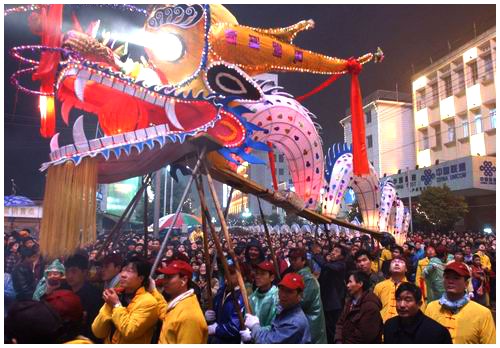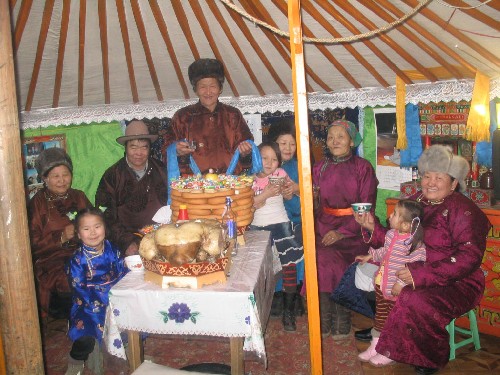
▲Chinese people enjoy Lantern Festival in the Harvest Moon Festival
They might not be able to spell it correctly, but just pronounce it, Chuseok or Chusok or Hangwai, the minds of foreigners who have been in Korea during any past September/October will ease into a major holiday period. They might not know how to pronounce that holiday, but they might even tell that it is celebrated on the fifteenth of the eight month of the Korean calendar. If they run short of words and eloquence in explaining, they can simply and rightly say that "it is a thanksgiving feast". A Korean friend intelligently explained it that "it is Hangawi - coming from han which means great and gawi implying middle. Foreigners know well and have been equally longing for Chuseok for, among the reasons, the feeling that the day before it and afterwards are legal holidays. The real Chuseok, in the Gregorian calendar, was on October 06th in 2006, September 25th in 2007, and will be September 14th in 2008.
While the locals have always been mixed up in the chaos of hectic schedules, mixed happiness, huge spending, family reunions, and a mass exodus of returning to hometowns where the spirits of one's ancestors are enshrined, Chonnam Tribune has been wondering, curious, and in search to learn "what have and could foreigners been doing during such a time?", "what are the foreigners' feelings when Chuseok comes around the corner - does Chuseok raise the gauges of homesickness, reminds them of their homes' festivals?", and "what are their opinions and recommendations for things to do for those who can not make it to where their spirits belong?"
When asked about Chuseok, an accounting graduate student, Muki from Mongolia admired the way people keep a special time of the year to perform ancestral worship rituals where they visit tombs of ancestors to trim grasses and clean graves and the tomb. She feels that offering food, drink, and crops to ancestors has a special meaning to blessing and gratitude to their ancestors. To her, Chuseok is a remembrance to one of her country's festivals, Tsagaan Sar or White Month, to mark the end of winter and the beginning of a new year's cycle. It is a time for unification and reinforcing social bonds. Well ahead of time, preparations for the festive starts. "Families gather in the eldest man's residence called a ger. Relatives, neighbors, friends, and guests will be treated to meals bountifully. More than a thousand buuz and dumplings are made and lined on wooden plates and put outside to freeze for the next day to be steamed. Food, dairy, mild milk, and vodka are reserved in all families for the occasion." A crescent-shaped rice cake, Songpyeon, prepared and eaten during Chuseok reminds Muki among the meals Mongolians stock-up in the night of Tsagaan Sar.
What is Chuseok all about? One foreigner collectively answers that "It is mostly about family and relatives getting together; eat songpyeon, wear traditional costumes - hanbok; experienicing traditional dance (Gang-kang-sul-le); praying, bowing, preparing meals grown in that year for ancestors; and cleaning and trimming the ancestors' graves and tombs." She says that during the whole three years she has been in Korea, she has always been going back to her home country during Chuseok. "The feelings of loneliness during Chuseok add to my homesickness," she says. She mostly enjoys the traditional Chinese Lantern Festival or Yuanxiao Jie falling on the fifteenth of the first month of the Chinese New Year. It is the last day of a two weeklong Chinese New Year cerebration where people with their families gather in the show place to enjoy the beautiful lanterns displayed.
Doing things that require a quiet environment, sleeping well to have enough rest, reading favorite non-academic books, and watching Korean comedy TV programs are among the activities some foreigners have been doing during Chuseok. Comparing with the festivals back home, Indonesia and Bangladesh, Dio and Tareq relate Chuseok to a festival at the end of Ramadan, or Puasa in Indonesian language, the month of fasting which is integral to Islam in Indonesia and Bangladesh, as elsewhere in the Muslim world, during which Muslims fast from dawn to dusk. Muslims may not drink, eat, smoke, or do other things which may be lawful during other times. At the end, comes Eid-ul-Fitri - the time of hospitality and paying visit to relatives, friends, and neighbors - regardless their religious orientation.
Eid ul Fitri in the Islamic world is a time of giving charity. The fasting of Ramadan is meant to remind people what life is like for their less fortunate brethren and the alms giving at Eid is a continuation along the same idea. Eid is a joyful experience and everybody is out and about celebrating. In the Zanzibar Islands of Tanzania, for example, the partying continues for four solid days and many open areas around town and in the villages turn into festival venues. It is a great time to see all the little girls in their new dresses and the boys in their new sneakers. The girls wear kohl around the eyes regardless of age, and the boys run around firing cap guns. There is a general feeling of celebration as people go from house to house visiting friends and relatives and attend concerts and discos at night.

| ▲A Mongolian family celebrate Harvest Festival inside of their ger |
Mwaka Kogwa, at the end of July, is a colorfully celebrated festival in Zanzibar which originates in Persia and based on the New Year according to the Shirazi calendar. Festivities are accompanied by ancient rites and rituals, such as symbolic fires and mock fights, which are believed to ensure peace and harmony for the village in the coming year. Men taking part in the fights defend themselves with banana stems (in place of the traditional cudgels and clubs) while women stroll through the village dressed in their best clothes, taunting the men with songs about village life and love. The ritual is said to allow villagers to air any grievances and vent their anger, thus ensuring conflicts are not carried into the coming year. The celebration ends with feasts, singing and dancing, often carrying on late into the night. It is a local belief that anyone without a guest for this festival is unhappy.
The Nepalese and many Indians indulge in the biggest festival of the year, Dashain, during the month of Kartik (September/October). Dashain is the longest and the most auspicious festival in the Nepalese annual calendar, celebrated by Nepalese and Indians of all castes and creeds throughout Nepal and some parts of India. The fifteenth day of celebration occurs during the bright lunar fortnight ending on the day of the full moon. Thorough out the kingdom of Nepal and parts of Hindustan, the goddesses Durga in all her manifestations are worshiped with innumerable pujas, abundant offerings and thousands of animal sacrifices for the ritual holy bathing, thus drenching the goddess for days in blood. In preparation for Dashain every home is cleansed and beautifully decorated, painted as an invitation to the mother goddess, so that she may visit and bless the house with good fortune. During this time, the reunion of distant and nearby relatives occurs in every household.
During Chuseok, one can decide to spend time at the spa, sauna, or jimjil-bangs, where many foreigners tend not to be comfortable to attend with a mob watching them. Some saunas seem to be in operation during Chuseok and the good news is that only a few locals seem to be there. One can then come back and arrange and cleaning his/her room, organize study desks, and keep clothes in order for a new start soon after Chuseok. Some foreigners, including myself, have been utilizing the Chuseok holidays having their countries'/regions' associations/groups' annual meetings and create own mini-chuseoks.
Turning the feelings of loneliness in to a better time pass, resting moment, visiting Korean friends' hometowns, or doing the most important matters in academic are among the ways foreigners decipher Chuseok. There is a Chuseok festival everywhere and to everyone. Only the naming may differ!
[277 Foreign Community]

